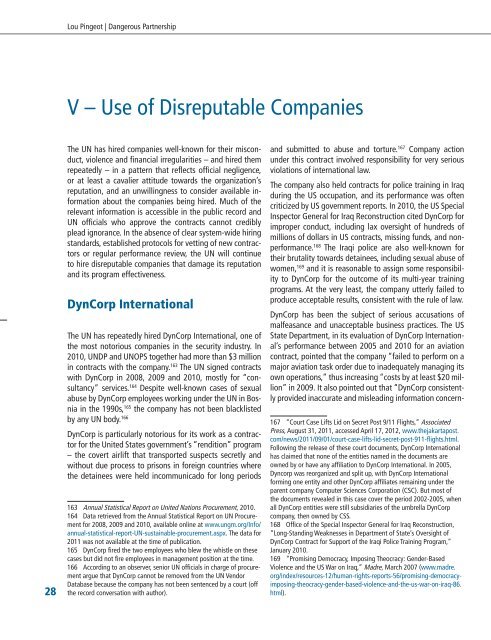Dangerous Partnership - Global Policy Forum
Dangerous Partnership - Global Policy Forum
Dangerous Partnership - Global Policy Forum
You also want an ePaper? Increase the reach of your titles
YUMPU automatically turns print PDFs into web optimized ePapers that Google loves.
Lou Pingeot | <strong>Dangerous</strong> <strong>Partnership</strong><br />
V – Use of Disreputable Companies<br />
28<br />
The UN has hired companies well-known for their misconduct,<br />
violence and financial irregularities – and hired them<br />
repeatedly – in a pattern that reflects official negligence,<br />
or at least a cavalier attitude towards the organization’s<br />
reputation, and an unwillingness to consider available information<br />
about the companies being hired. Much of the<br />
relevant information is accessible in the public record and<br />
UN officials who approve the contracts cannot credibly<br />
plead ignorance. In the absence of clear system-wide hiring<br />
standards, established protocols for vetting of new contractors<br />
or regular performance review, the UN will continue<br />
to hire disreputable companies that damage its reputation<br />
and its program effectiveness.<br />
DynCorp International<br />
The UN has repeatedly hired DynCorp International, one of<br />
the most notorious companies in the security industry. In<br />
2010, UNDP and UNOPS together had more than $3 million<br />
in contracts with the company. 163 The UN signed contracts<br />
with DynCorp in 2008, 2009 and 2010, mostly for “consultancy”<br />
services. 164 Despite well-known cases of sexual<br />
abuse by DynCorp employees working under the UN in Bosnia<br />
in the 1990s, 165 the company has not been blacklisted<br />
by any UN body. 166<br />
DynCorp is particularly notorious for its work as a contractor<br />
for the United States government’s “rendition” program<br />
– the covert airlift that transported suspects secretly and<br />
without due process to prisons in foreign countries where<br />
the detainees were held incommunicado for long periods<br />
163 Annual Statistical Report on United Nations Procurement, 2010.<br />
164 Data retrieved from the Annual Statistical Report on UN Procurement<br />
for 2008, 2009 and 2010, available online at www.ungm.org/Info/<br />
annual-statistical-report-UN-sustainable-procurement.aspx. The data for<br />
2011 was not available at the time of publication.<br />
165 DynCorp fired the two employees who blew the whistle on these<br />
cases but did not fire employees in management position at the time.<br />
166 According to an observer, senior UN officials in charge of procurement<br />
argue that DynCorp cannot be removed from the UN Vendor<br />
Database because the company has not been sentenced by a court (off<br />
the record conversation with author).<br />
and submitted to abuse and torture. 167 Company action<br />
under this contract involved responsibility for very serious<br />
violations of international law.<br />
The company also held contracts for police training in Iraq<br />
during the US occupation, and its performance was often<br />
criticized by US government reports. In 2010, the US Special<br />
Inspector General for Iraq Reconstruction cited DynCorp for<br />
improper conduct, including lax oversight of hundreds of<br />
millions of dollars in US contracts, missing funds, and nonperformance.<br />
168 The Iraqi police are also well-known for<br />
their brutality towards detainees, including sexual abuse of<br />
women, 169 and it is reasonable to assign some responsibility<br />
to DynCorp for the outcome of its multi-year training<br />
programs. At the very least, the company utterly failed to<br />
produce acceptable results, consistent with the rule of law.<br />
DynCorp has been the subject of serious accusations of<br />
malfeasance and unacceptable business practices. The US<br />
State Department, in its evaluation of DynCorp International’s<br />
performance between 2005 and 2010 for an aviation<br />
contract, pointed that the company “failed to perform on a<br />
major aviation task order due to inadequately managing its<br />
own operations,” thus increasing “costs by at least $20 million”<br />
in 2009. It also pointed out that “DynCorp consistently<br />
provided inaccurate and misleading information concern-<br />
167 “Court Case Lifts Lid on Secret Post 9/11 Flights,” Associated<br />
Press, August 31, 2011, accessed April 17, 2012, www.thejakartapost.<br />
com/news/2011/09/01/court-case-lifts-lid-secret-post-911-flights.html.<br />
Following the release of these court documents, DynCorp International<br />
has claimed that none of the entities named in the documents are<br />
owned by or have any affiliation to DynCorp International. In 2005,<br />
Dyncorp was reorganized and split up, with DynCorp International<br />
forming one entity and other DynCorp affiliates remaining under the<br />
parent company Computer Sciences Corporation (CSC). But most of<br />
the documents revealed in this case cover the period 2002-2005, when<br />
all DynCorp entities were still subsidiaries of the umbrella DynCorp<br />
company, then owned by CSS.<br />
168 Office of the Special Inspector General for Iraq Reconstruction,<br />
“Long-Standing Weaknesses in Department of State’s Oversight of<br />
DynCorp Contract for Support of the Iraqi Police Training Program,”<br />
January 2010.<br />
169 “Promising Democracy, Imposing Theocracy: Gender-Based<br />
Violence and the US War on Iraq,” Madre, March 2007 (www.madre.<br />
org/index/resources-12/human-rights-reports-56/promising-democracyimposing-theocracy-gender-based-violence-and-the-us-war-on-iraq-86.<br />
html).


